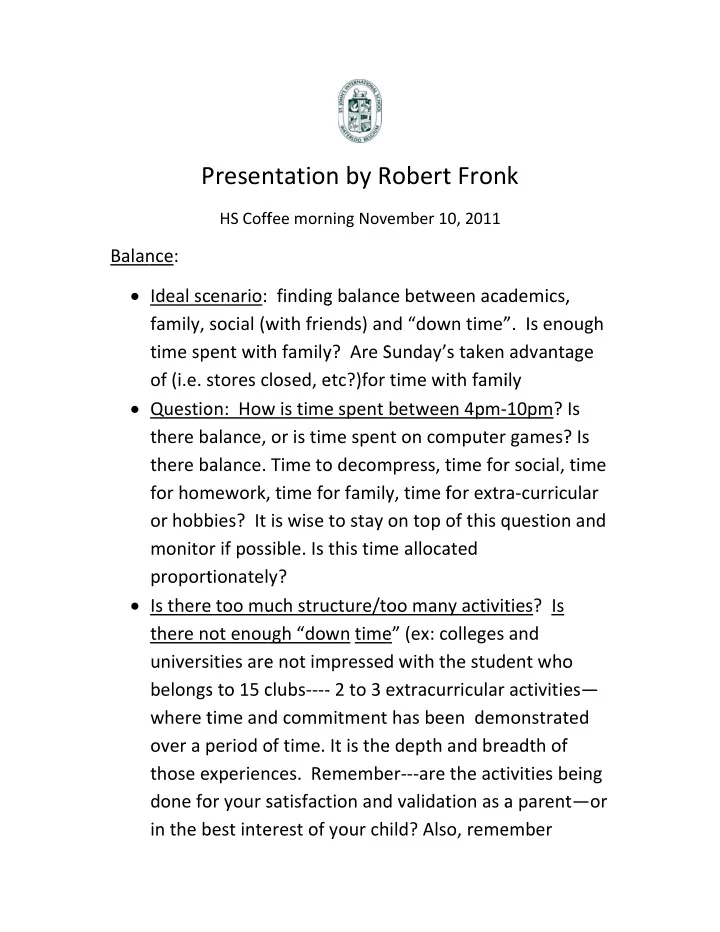

Presen P ntation n by R Robert t Fron k HS Coff fee morn ning Nov ember 1 0, 2011 Balan nce: Ideal sc cenario: finding g balanc ce betwe een aca ademics, , family, social (w with frie ends) an nd “dow wn time” ”. Is eno ough time sp ent with h family y? Are S Sunday’ s taken advanta age of (i.e. s stores c losed, e etc?)for time wi ith fami ily Questio on: How w is time e spent betwee en 4pm ‐ 10pm? Is there b alance, or is tim me spen nt on com mputer games? ? Is there b alance. Time to o decom mpress, t time for r social, time for hom mework, , time fo or family y, time f for extr a ‐ curric cular or hobb bies? It is wise to stay on top o of this q question n and monito r if poss sible. Is this tim me alloca ated proport tionatel y? Is there e too mu uch stru ucture/to oo man y activit ties? Is there n ot enou ugh “dow wn time e” (ex: c olleges and univers ities are e not im mpressed d with t he stud ent who o belongs s to 15 c clubs ‐‐‐‐ ‐ 2 to 3 e extracu rricular activitie es— where t time an d comm mitment has bee en dem monstrat ted over a p period o of time. It is the e depth and bre eadth of f those e xperien nces. Re emembe er ‐‐‐ are the act ivities b being done fo or your s satisfact tion and d validat tion as a a parent t—or in the b best inte erest of your ch hild? Als o, reme ember
teenagers, like adults need to decompress after a long school day, so it is probably not the best idea to badger them immediately when they come home from school with questions about school and homework. Give them that time to decompress and ask later. Homework: Is time devoted to homework? At St. John’s with the rigorous curriculum ‐‐‐ 2 ‐ 3 hours a night is not uncommon. Of course that would fluctuate, and not every night would be that much. For the student who does not do any activities—work with your student to find out what motivates him/her ‐‐‐ ‐‐ for if their chosen activity is selected it just to please a parent—that participation will not be sustainable—it will produce just short term results. Finding an activity that they will like will produce more long term results. (Ex: if they like art ‐‐‐ try to attend a museum with your child). Authority: Consistency is key: Between mother and father: this prevents kids from playing one parent against the other parent. Parents demonstrating a united front are very important. Consistency in our responses is important. Choosing expediency over consistency is a huge mistake (i.e. cleaning his room for him/her because it is easier and quicker to do yourself)
Don’t expect to get validation from your child on raising them or discipline issues—this comes from other adults and/or parent groups Don’t engage in verbal battles (i.e. verbal tug of war)— when you have to say “NO”, it is ok to walk away when your student wants to engage in verbal sparring or negotiations. It is important to role ‐ model for your child how to calm down in heated situations. If your child is yelling to get their point across—you can state, “When you are calmed down ‐‐‐ we can talk.” This puts the control back to you as a parent, and models for them what a productive environment needs to be to discuss conflicts. THE MORE YOU GIVE IN TO NEGOTIATING WITH YOUR CHILD—THE MORE YOU ARE TRAINING YOUR CHILD NOT TO ACCEPT LIMITS If an issue has to be revisited ‐‐‐ determine a time that is usually a stress free time—(perhaps on the weekend) and not at say, the end of the week or late at night— when everybody is tired. Consequences for unacceptable behaviour/actions are needed. Type of consequences is determined by degree or extreme of the unacceptable behaviour or action. Be firm, but not rude, demeaning or nasty when expressing your authority.
Be realistic when it comes to setting limits. For example ‐‐‐ setting a curfew for 9:30pm for a teenager on a weekend is likely not going to be realistic or enforceable. Pick your battles ‐‐‐ but make sure the battles you pick are ones that you can win. Remember: Raising teenagers is an on ‐ going, always changing process. It changes often with new challenges. Teenagers test limits. That is part of their DNA .
Recommend
More recommend